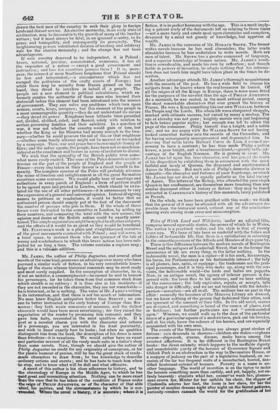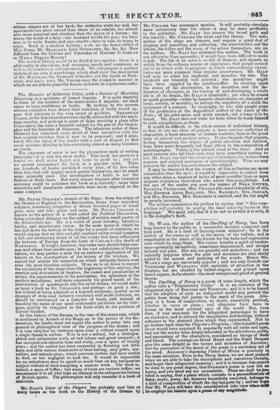Tales of Welsh Land and Welsherie,7under an affected title, comprise
several agreeable stories, the scenes of which lie in Wales. The author is a practised writer, and his style is that of twenty years ago. We have of late been so racketed with the follies and foibles of fashionable life, that there is a satisfaction in returning to the romantic passions of the Alfreds and Henries of days gone by.
There is this difference between the modern novels of Burlington Street and the antiques of Leadenhall Street, that in the former the accessories of life are every thing, in the latter nothing. In the fashionable novel, the man is a cipher—it is his cook, his carriage, his horse, his Parliamentary or his fashionable interest ; the lady- is all plumes, lace, satin, or equipage ; the tradesmen are the prin- cipal personages, and it is they who make up, along with the ser- vants, the fashionable world—the lords and ladies are puppets. Now, in an antique novel, the agency of inferior persons is dis- pensed with: the lover flies to his mistress, and we hear nothing of the conveyance; the lady captivates, rejects, or accepts, falls into danger or difficulty, and we are not troubled with the details : passion—sensation—are all in all. The milliner has no part in the affair: assuredly the heroines of the Minerva Library are dressed, but we know nothing of the person that fashioned their attire, and are ignorant of the amount of their bills. In the old novel, scenes are designed, and something is heard of the names of places, real or fictitious ; but further particulars are not " condescended upon." Whereas, we could walk up to the door of the paiticular house of a particular square of a modern hero, pick out his liveiies, call at his club, know the colours of his horses, and are especially acquainted with his own man. The events of the Minerva Library are always great strokes of fortune: ruin descends in showers—children are stolen—orphans swarm—shipwreck, storms, disease, make havoc among the sweetest affections. It is far different in the Burlington Street books : the direst calamity which happens to the ineffable dignity and unmatchable purity of the heroine of Grosvenor Square and Oldoalc Park is an obstruction in the way to Devonshire House, or a soupcon of jealousy on the part of a legislative husband, on oc- casion of the far too frequent visits of a moustached, booted, dan- dified lieutenant-colonel of hussars. Poverty is a name in an- other language. The world of invention is on the tiptoe to make the heroine something more than earthly, and yet, happily, not en- tirely heavenly: chariots whirl her, cosmet;es wash her, plumes- siers crown her, Minter for her unfolds his chair, the slipper of Cinderella adorns her foot, the loom is her slave, for her the painter of muslins dreams night- after night on the fairest patterns, curiosity-venders ransaek the world for the gratification of her . whims, singers are at her beck, the orchestra waits her nod, her apartments are more sacred than those of an odalisk, her attend- . ants more punctual and obedient than the slaves of a harem : she waves the wand of a fairy—her husband wields the pen ; his busi- ness is to write franks and sign checks—hers to rule, to reign, to enjoy. Such is a modern heroine : such are the beaux-idgals of MTS. GORE, Mr. BEAZELEY, Lord NORMANBY, &C. &C. &c. How different from the Cecilias and Clarindas of Madame D'ARBLAY or MARIA RETINA ROCHE! The novelist library ought to be divided into epochs : there is a philosophy in classifying and arranging novels and romances, as well as in concholoey and entomology. We will prepare a quinary system of our own in novelology, which shall rival the discoveries of Mr. Mactiav, the NEWTON of beetles and the beetle of NEW- TONS, and make even Mr. VIGORS envy the complete manner in -which we are able to place the female novelists in a quincunx order.



























 Previous page
Previous page